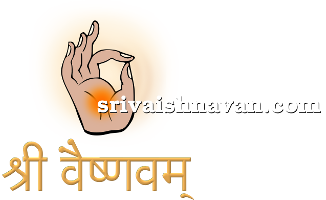Vadakalai and Tenkalai
We have got two sects, Vadakalai and Tenkalai. What is the difference between these two schools of thought? There is no fundamental or basic difference in the philosophy, between the two schools, Vadakalai and Tenkalai. There is only difference of opinion on some issues. These are not significant. When did this division, Vadakalai and Tenkalai […]
The Three Secrets
What are the three secrets in our system (rahasya traya)? The first and the most important is called Ashtakshara. This consists of 8 syllables and is in the form of three words. The first word is a single syllable Om. The second word is Namaha. The third word is Narayanaya. So, the ashtakshara is OM […]
Prapatti
Explain about the second means of attainment of moksha, namely, prapatti. Prapatti is also called Saranagati, Bharanyasa, Bhara Samarpana and Nyasa. Here, we seek the Lord as the sole refuge, for salvation. We surrender ourselves unto Him; and pray for salvation. How frequently is this prapatti to be performed? How is it different from bhakti […]
The Departure of the Soul
At the time of death, how does the Jivatma depart from this body? This is well explained in the Upanishads. At the time of death, the Jivatma leaves the body. When the Jivatma leaves the body, the following also leave:- The five senses of knowledge; (Jnana Indriyas) The five senses of action; (Karma Indriyas) Manas […]
Jivatma and Paramatma
The Jivatma and matter are also eternal. Is there only one Jivatma or there are several of them? Jivatmas are infinite in number. The fact that they are countless, has been made clear in the Vedas,as Well as in the Bhagavad Gita. Then, is there any difference between one Jivatma and another, and if so, […]
Karma, Jnana and Bhakti Yogas
What are the types of activities of the Jivatma, in this world? The activities pursued by Jivatma are of three kinds: Nitya: That which has to be done, without fail, regularly, like Sandhyavandana. By not doing these, one incurs sins. Naimittika: Those, which have to be done on particular occasions, like Tarpana during eclipses. Kamya: […]
Advaita, Visistadvaita and Dvaita
How did the three systems of Vedanta philosophy, namely Advaita, Visishtadvaita and Dvaita come about? The question can be answered with a little bit of background on the Upanishads.The Upanishads are of three types namely bheda sruti, abheda sruti and ghataka sruti. What is the Bheda sruti? There are many passages in the Vedas, which […]
Iswara – The Lord and Master
What is the essential nature of Iswara? The essential nature of Iswara is truth, knowledge, infiniteness, happiness and purity. He is present everywhere. He knows everything. Why is He called Bhagavan? He possesses six qualities and that is why He is called Bhagavan. Bhaga in Sanskrit means good quality. What are these six qualities? These […]
Matter and Creation
What is the meaning of Achetana? As mentioned earlier, we have three tattvas or reals. We will next take up Achetana and then finally Iswara. Achetana means non-sentient. It means that it does not possess any knowledge. So, theAchetana is not capable of thinking, since it has no knowledge(pramana). What are the categories under this […]
The Eternal Jivatma
Please explain how you say that the soul is different from the body? When I say “this is my book”, I mean the book belongs to me. The book is obviously something different from myself. Similarly, I say “this is my body”. So, the body is different from myself. Here, the word “myself refers to […]

